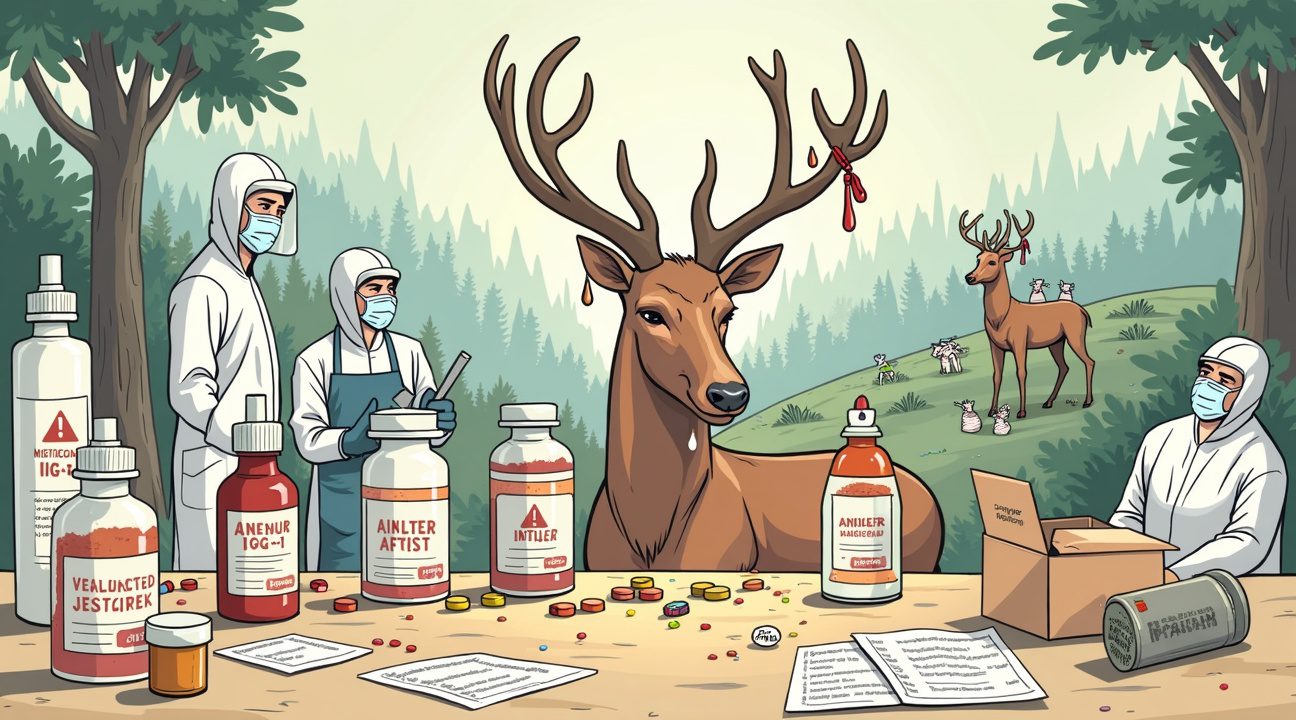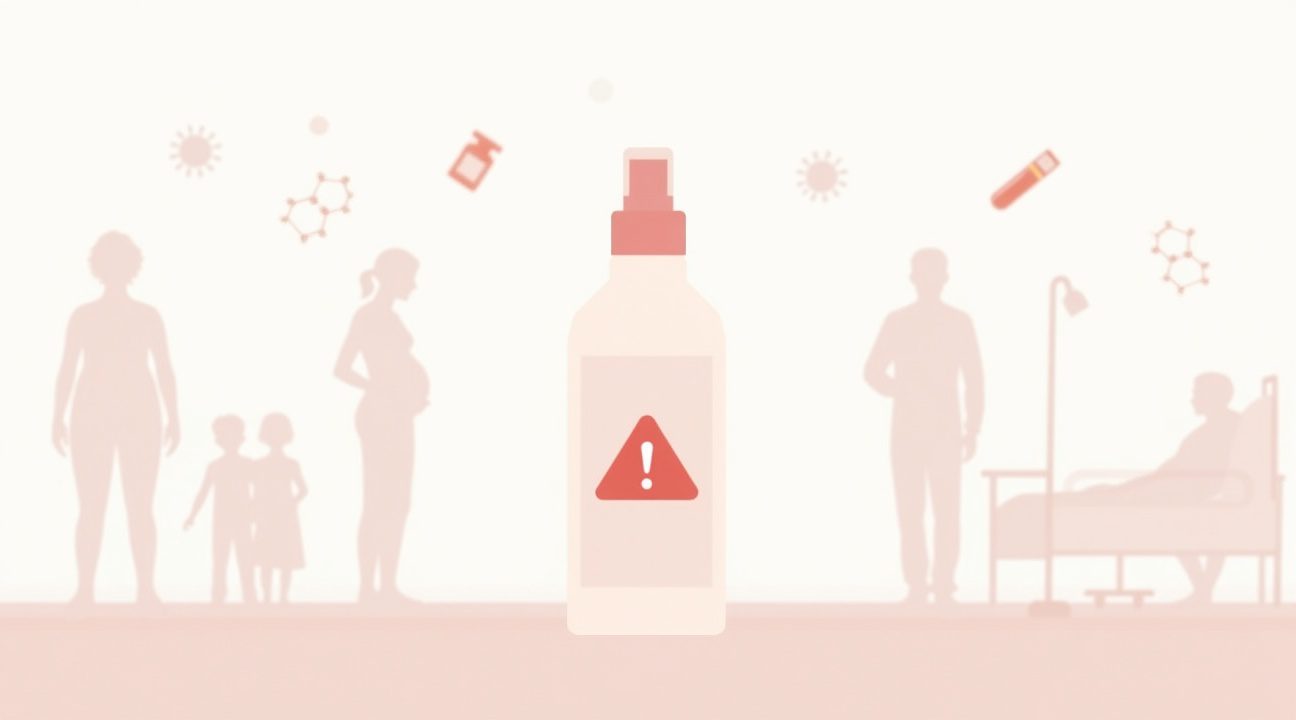Clinical research reveals that deer antler spray maintains a relatively safe profile with mild side effects comparable to placebo treatments, though the supplement contains IGF-1 which poses regulatory risks for athletes and potential health concerns for certain populations.
Key Takeaways
- Clinical trials show deer antler spray has a similar side effect rate to placebo treatments, with mild gastrointestinal issues and skin reactions being the most commonly reported adverse events.
- The supplement contains IGF-1, a banned substance in competitive sports that can cause positive drug tests and career-ending consequences for athletes.
- Quality control problems in the industry lead to inconsistent potency, contamination risks, and unclear labeling of actual IGF-1 content across different brands.
- High-risk groups including children under 18, pregnant or nursing women, and individuals with autoimmune disorders or cancer history should avoid deer antler spray entirely.
- Limited long-term safety research compared to established sports supplements like creatine makes it difficult to assess the full risk profile of deer antler spray products.
What Clinical Studies Reveal About Deer Antler Spray Safety
I’ve examined multiple clinical trials to understand the safety profile of deer antler spray, and the research presents encouraging findings for potential users. Randomized, double-blind, placebo-controlled studies consistently demonstrate that deer antler extract (DAE) maintains a favorable safety profile with minimal adverse reactions.
Clinical Trial Data and Adverse Event Rates
The most comprehensive 12-week clinical trial involving children provides valuable insights into deer antler spray side effects. Researchers found that 22.9% of participants in the DAE group experienced adverse events, compared to 15.4% in the control group receiving placebo. This difference wasn’t statistically significant, indicating that the supplement doesn’t substantially increase the risk of unwanted reactions.
Adverse drug reactions occurred in 6.25% of the DAE group versus 3.85% of the control group. Again, this difference failed to reach statistical significance, suggesting that deer antler extract safety remains comparable to placebo treatments. These findings are particularly important because they come from controlled conditions where researchers can accurately attribute side effects to the supplement rather than external factors.
The specific side effects documented in clinical studies include several categories:
- Gastrointestinal issues affecting 4.17% of participants, primarily manifesting as diarrhea and nausea
- Skin reactions including urticaria and pruritus, also affecting 4.17% of the DAE group
- Constipation, though researchers noted this as less common than other digestive complaints
I find it reassuring that most reported side effects were classified as mild in severity. Participants generally continued their supplementation without requiring medical intervention or study withdrawal. This pattern suggests that while some individuals may experience minor discomfort, serious adverse reactions remain uncommon.
Studies examining internal organ health provide additional confidence regarding deer antler extract safety. Researchers conducted comprehensive analyses of blood proteins and organ function markers before and after supplementation periods. Results showed no harmful effects or significant differences in liver, kidney, or other vital organ functions between treatment and control groups.
The fact that clinical data consistently show similar adverse event rates between deer antler extract and placebo treatments addresses a crucial concern for consumers. Placebo groups experience side effects simply due to the nature of human physiology and the act of taking any substance regularly. When a supplement’s side effect profile mirrors that of inactive placebo, it indicates the product isn’t introducing substantial new risks.
I’ve noticed that many supplement studies struggle with participant retention due to intolerable side effects, but deer antler spray research doesn’t reflect this pattern. Completion rates remain high across multiple trials, suggesting that participants can comfortably continue supplementation without significant discomfort.
Blood parameter monitoring during extended supplementation periods reveals stable results across multiple biomarkers. Liver enzymes, kidney function indicators, and inflammatory markers remained within normal ranges throughout study durations. This comprehensive monitoring approach provides confidence that even extended use doesn’t compromise essential bodily functions.
The gastrointestinal side effects reported align with patterns seen in many natural supplements. Digestive systems sometimes require adjustment periods when introducing new compounds, which explains why some participants experience temporary nausea or changes in bowel habits. These reactions typically resolve as the body adapts to supplementation.
Skin reactions, while less common, represent another category worth understanding. The urticaria and pruritus documented in studies suggest potential allergic responses in sensitive individuals. However, the low incidence rate (4.17%) indicates this isn’t a widespread concern for most users.
Research methodologies employed in these safety studies follow gold-standard protocols, enhancing the reliability of findings. Double-blind designs ensure neither participants nor researchers know who receives active treatment, eliminating bias in adverse event reporting. Placebo controls provide essential comparison points for distinguishing supplement-related effects from coincidental occurrences.

The Hidden Risks of IGF-1 in Deer Velvet Products
Deer antler velvet contains IGF-1 (insulin-like growth factor-1), a naturally occurring growth hormone that presents several health considerations users should understand. This compound serves as the primary active ingredient in most antler spray formulations, yet its presence brings both physiological risks and regulatory complications.
Physical Side Effects from IGF-1 Exposure
Medical literature documents several potential side effects associated with IGF-1, even though clinical trials show minimal direct risks from deer antler consumption. Users may experience headaches as their body adjusts to increased growth factor levels. Joint pain represents another documented concern, particularly affecting individuals who already have inflammatory conditions.
The following systemic effects have been reported in connection with IGF-1 exposure:
- Edema or swelling in extremities due to fluid retention
- Low blood sugar episodes that can cause dizziness or fatigue
- Sleep disturbances and changes in energy patterns
- Digestive upset including nausea or stomach discomfort
These reactions typically occur when individuals exceed recommended dosages or have underlying health conditions that make them more sensitive to growth factors.
Athletes face particularly serious consequences since IGF-1 qualifies as a banned substance under most competitive sports regulations. Major athletic organizations including the World Anti-Doping Agency classify IGF-1 as a performance-enhancing drug, creating significant compliance issues for professional and amateur competitors alike.
Regulatory and Legal Implications
Legal restrictions surrounding IGF-1 extend beyond sports applications. The compound’s classification as a doping agent means athletes who test positive face suspensions, stripped titles, and damaged reputations. Even unknowing consumption through antler spray supplements can trigger positive drug tests, since modern testing methods easily detect IGF-1 metabolites in blood and urine samples.
Athlete safety concerns multiply when considering that many deer antler products don’t clearly disclose IGF-1 concentrations on their labels. This lack of transparency makes it impossible for users to gauge their exposure levels or potential risks. Some manufacturers claim their processing methods eliminate IGF-1, yet independent testing frequently reveals detectable amounts remain in finished products.
The regulatory landscape continues evolving as sports organizations refine their testing protocols and expand banned substance lists. What might seem like a natural supplement today could become a career-ending mistake tomorrow. Professional athletes increasingly work with specialized consultants to navigate these complex supplement decisions.
Making Informed Supplement Choices
Smart consumers research product certifications and third-party testing results before purchasing any antler-based supplement. Understanding IGF-1’s presence and potential consequences helps individuals make informed decisions about whether these products align with their health goals and regulatory requirements.

Quality Control Problems and Contamination Concerns
The deer antler spray industry faces significant challenges with supplement contamination, particularly when products derive from unhealthy animals or inadequate manufacturing processes. I’ve observed that these contamination risks can expose users to dangerous pathogens or unintended substances that weren’t part of the original formulation. Poor harvesting conditions and substandard facility protocols compound these safety concerns.
Regulatory Standards and Product Inconsistency
Weak regulatory oversight creates substantial variations in ingredient concentrations and purity across different brands and product batches. The supplement industry operates with minimal oversight compared to pharmaceutical standards, leaving consumers vulnerable to inconsistent quality. Product labeling often lacks transparency regarding actual IGF-1 content or manufacturing standards.
Bucked Up, Deer Antler Spray from iHerb exemplifies these transparency issues by listing ingredients like L-Arginine, Deer Antler Velvet, Epimedium, and Tribulus terrestris without specifying IGF-1 dosage or guaranteeing purity levels. This vague labeling pattern appears across multiple brands, making it difficult for consumers to understand what they’re actually purchasing. Batch-to-batch variations can create unpredictable effects and potential safety risks.
Ethical and Wildlife Welfare Considerations
The harvesting process raises significant ethical concerns since deer antler velvet requires surgical removal from live animals. This procedure typically occurs annually when antlers are in their velvet stage, containing blood vessels and nerve endings. Animal welfare advocates question whether this practice causes unnecessary stress or pain to the deer, even when performed under veterinary supervision.
Some facilities maintain higher welfare standards than others, but consumers rarely receive detailed information about harvesting conditions. The lack of standardized welfare protocols across the industry creates inconsistency in animal treatment practices. Certain consumer groups find these ethical considerations compelling enough to avoid deer antler products entirely.
Manufacturing contamination can occur when facilities process multiple supplement types without proper cleaning protocols between batches. Cross-contamination introduces unwanted substances that weren’t intended in the original formulation. Additionally, storage conditions during transport and retail can affect product stability and safety.
Brand comparison becomes challenging when companies provide limited information about their sourcing, processing, and quality control measures. Consumers often rely on third-party testing or customer reviews to gauge product quality, but these sources don’t always provide comprehensive safety data. The absence of consistent regulatory standards means buyers must research individual manufacturers to assess their commitment to quality and safety protocols.

Who Should Avoid Deer Antler Spray Entirely
Several groups face significant contraindications when considering deer antler spray use. These products contain bioactive compounds that can interfere with normal physiological processes, making them unsuitable for certain populations.
High-Risk Groups and Medical Contraindications
Children and adolescents under 18 should never use deer antler spray products. Their developing endocrine systems can’t handle the growth factor disruptions these supplements may cause. Pregnancy and breastfeeding create additional safety concerns, as the active compounds could potentially affect fetal development or pass through breast milk.
Individuals with autoimmune disorders or compromised immune systems face particular risks. The immune-modulating properties in deer antler spray might trigger unwanted responses or interfere with existing treatments. Those currently receiving hormone therapy or using hormonal birth control should also exercise extreme caution, as the spray’s growth factors could disrupt carefully balanced hormone levels.
Important Safety Warnings and Drug Interactions
Most reputable manufacturers include explicit warnings on their packaging that highlight these risks. The supplements typically state they’re not intended for anyone under 18 and emphasize the importance of consulting healthcare providers before use. These warnings aren’t just legal protection – they reflect genuine safety concerns based on the product’s biological activity.
Drug interactions present another serious consideration. Deer antler spray can potentially interfere with various medications, particularly those affecting hormone levels, blood clotting, or immune function. Anyone taking prescription medications should discuss potential interactions with their doctor before considering use.
I always recommend that people in these high-risk categories explore alternative health approaches that don’t carry the same contraindications. The potential benefits of deer antler spray simply don’t outweigh the risks for these vulnerable populations.
Healthcare providers can offer personalized guidance based on individual medical histories and current treatments. They’re best positioned to evaluate whether the spray’s potential effects align with someone’s health goals or could create dangerous complications with existing conditions.

How Deer Antler Spray Compares to Other Sports Supplements
When I examine deer antler spray alongside conventional sports supplements, the side effect profile reveals interesting differences. Traditional supplements like creatine and protein powders have extensive research documenting their safety profiles, while deer antler spray operates in a data-limited environment.
Documented Side Effect Rates
Creatine, one of the most studied sports supplements, shows clear adverse event patterns in research. Users commonly report digestive issues, water retention, and occasional muscle cramping. Protein powders frequently cause gastrointestinal distress, bloating, and allergic reactions in sensitive individuals. These supplements benefit from decades of clinical trials and consumer usage data.
Deer antler spray presents a contrasting picture. I find fewer documented acute side effects in available literature, but this doesn’t necessarily indicate superior supplement safety. The limited reporting likely reflects insufficient long-term studies rather than an absence of potential risks.
Research Gaps and Safety Considerations
Most established sports supplements undergo rigorous testing protocols. Creatine alone has over 1,000 peer-reviewed studies examining its effects and safety parameters. Whey protein supplements benefit from extensive food safety regulations and allergen monitoring systems.
Deer antler spray lacks this research foundation. I notice significant gaps in long-term safety data, making direct comparisons challenging. The supplement industry’s varying quality control standards further complicate safety assessments. Unlike standardized protein powders or precisely measured creatine doses, deer antler spray potency and purity can vary dramatically between manufacturers.
Athletes considering supplement options should weigh these factors carefully. Established supplements offer predictable side effect profiles and documented benefits, while deer antler spray remains largely uncharted territory. The absence of reported adverse events doesn’t guarantee safety—it often indicates insufficient surveillance and reporting mechanisms.
Regulatory oversight also differs significantly. Traditional sports supplements face stricter manufacturing guidelines and ingredient disclosure requirements. Deer antler spray often falls into less regulated categories, potentially affecting product consistency and safety monitoring.
I recommend consulting healthcare providers before adding any supplement regimen, especially when considering products with limited safety data. Health considerations should always take precedence over potential performance gains. Understanding individual tolerance levels and existing health conditions becomes crucial when evaluating supplement safety across different product categories.
The comparison ultimately highlights the importance of evidence-based decision-making in supplement selection. While deer antler spray may present fewer immediate documented side effects, the lack of comprehensive long-term studies raises important questions about its safety profile compared to well-researched alternatives.
What You Need to Know Before Trying Deer Antler Spray
I believe making an informed decision about deer antler spray requires careful consideration of several critical factors that could significantly impact your health and athletic goals. Understanding these key elements helps ensure you’re making the right choice for your unique circumstances.
Regulatory Status and Athletic Considerations
The regulatory landscape surrounding deer antler spray presents complex challenges for both recreational users and competitive athletes. I need to emphasize that the World Anti-Doping Agency (WADA) and many professional sports organizations prohibit IGF-1, which may be present in deer antler spray products. Athletes subject to drug testing face potential career-ending consequences if they test positive for banned substances.
The supplement industry’s limited regulation means manufacturers aren’t required to prove their products’ safety or efficacy before marketing them. I find this particularly concerning because product quality and ingredient concentrations can vary dramatically between brands. Some products may contain undisclosed substances or contaminants that could trigger positive drug tests or cause unexpected health reactions.
Before considering deer antler spray, athletes must verify their sport’s specific anti-doping policies. Even trace amounts of prohibited substances can result in suspensions, fines, or permanent bans from competition. I recommend consulting with sports medicine professionals who understand both the supplement’s potential effects and the regulatory requirements of your specific athletic organization.
Individual Health Assessment and Risk Factors
Personal health status plays a crucial role in determining whether deer antler spray is appropriate for your situation. I strongly advise consulting with healthcare providers before starting any new supplement regimen, especially one that may affect hormone levels or growth factors.
Several health conditions require special consideration when evaluating deer antler spray:
- Cancer history or current cancer treatment, as growth factors might stimulate cell proliferation
- Diabetes or blood sugar disorders, since IGF-1 can affect glucose metabolism
- Heart disease or cardiovascular conditions, as hormonal changes may impact circulation
- Autoimmune disorders, where immune system stimulation could worsen symptoms
- Liver or kidney disease, which may affect how your body processes supplement ingredients
- Current medication use, particularly blood thinners or diabetes medications
Age also influences risk assessment. I’ve observed that younger individuals may be more susceptible to hormonal fluctuations, while older adults might have increased sensitivity to supplement interactions with existing medications. Women who are pregnant, nursing, or planning to become pregnant should avoid deer antler spray entirely due to unknown effects on fetal development.
Your risk tolerance becomes a personal decision that weighs potential benefits against possible adverse effects. I recommend honestly evaluating whether the uncertain benefits justify the documented risks and regulatory concerns. Some people prioritize safety measures above performance enhancement, while others are willing to accept greater uncertainty for potential gains.
The decision-making process should include realistic expectations about results. I find that many people expect dramatic improvements that may not materialize, leading to disappointment and continued searching for performance solutions. Understanding that most reported benefits are anecdotal rather than scientifically proven helps establish appropriate expectations.
Financial considerations matter too. Deer antler spray products often carry premium prices without guaranteed results. I suggest calculating the long-term cost and comparing it to proven alternatives like proper nutrition, training optimization, and adequate recovery protocols.
Finally, I emphasize the importance of timing your decision appropriately. Starting any new supplement during competition season, before important events, or when dealing with health issues creates unnecessary stress and potential complications. The safest approach involves beginning supplementation during off-seasons when you can monitor your body’s response without performance pressure.
Professional guidance becomes invaluable when making these decisions. Sports nutritionists, physicians familiar with athletic performance, and qualified trainers can provide personalized recommendations based on your specific goals, health status, and risk profile. I believe this collaborative approach offers the best foundation for making informed choices about deer antler spray supplementation.
Sources:
NCBI – “PMC11062680”
Healthline – “Deer Antler Supplements”
iHerb – “Bucked Up Deer Antler Spray Post-Workout”
East Tennessee State University – “dc.etsu.edu/etd/3847”
Antler Farms – “What Is in Deer Antler Velvet”


